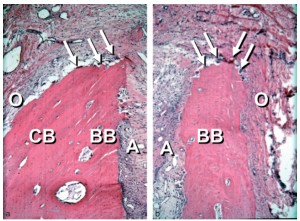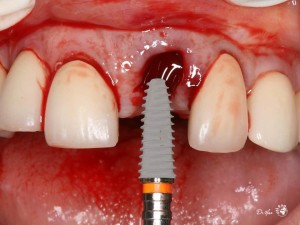I wanted to take a moment to review an older article that really helped me understand a key concept in implant dentistry. We encounter this daily and often need to be reminded of its importance. Dental implant surgeons need to understand the bone loss that occurs after a tooth extraction so they can devise ways of overcoming it.
The article of interest is titled, “Dimensional Ridge Alterations following Tooth Extraction. An Experimental Study in the dog.” This is by Mauricio G. Araujo and Jan Lindhe and was published in the Journal of Clinical Periodontology in 2005; vol 32: 212-218.
The authors designed a study using 12 mongrel dogs and performed premolar extractions. Multiple histologic samples were then taken at the 1,2,4, and 8 week mark post-extraction.
They describe a significant loss of the bony ridge both horizontally and vertically. The culprit? Bundle Bone.

Bundle bone is found in both lingual and buccal walls of the alveolar crestal bone surrounding teeth. It is fed by blood vessels that originate from within the adjacent periodontal ligament. This is important to understand because when a tooth is extracted there is a loss of blood supply to this bundle bone. It doesn’t matter how atruamatic we are, removing a tooth leads to the death of the periodontal ligament and thus the very blood supply for the most crestal portion of buccal and lingual bone surrounding that tooth. Unfortunately the buccal walls are entirely composed of bundle bone at the crest and this is in part the explanation for why, as the authors found, nearly 2mm of buccal bone wall height is lost and around 50% of buccal bone wall width. All within 8 weeks after an extraction.
This is a common problem the implant surgeon must face, and we’ll discuss the science behind what can be done to prevent or at least mitigate the loss of so much important bone for future dental implant sites.
Take home point: Extracting a tooth is going to lead to buccal bone loss if you don’t do something about it!



